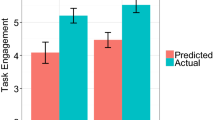Abstract
Previous theories of intrinsic motivation have traditionally ignored the experiential or subjective aspects of engagement in intrinsically and extrinsically motivated tasks. Part of the reason for the lack of research in this area was our ignorance of which emotions to study. Data are presented here from two studies designed to produce the first systematic evidence of changes in basic emotional states during task engagement. Our findings suggest that intrinsic and extrinsic tasks can be differentiated according to the emotional changes subjects retrospectively report about their engagement with these tasks, and point the way to future research incorporating emotion as an important variable to consider.
Similar content being viewed by others
References
deCharms, R., & Muir, M. S. (1978). Motivation: Social approaches. In M. Rosenweig & L. Porter (Eds.)Annual review of psychology. Palo Alto: Annual Reviews.
Deci, E. L. (1975).Intrinsic motivation. New York: Plenum.
Ekman, P. (1972). Universals and cultural differences in facial expressions of emotion. In J. Cole (Ed.),Nebraska symposium on motivation, 1971 (Vol. 19). Lincoln: University of Nebraska Press.
Ekman, P. (1973). Cross-cultural studies of facial expression. In P. Ekman (Ed.),Darwin and facial expression. New York: Academic Press.
Ekman, P. (1982).Emotion in the human face. New York: Academic Press.
Ekman, P., & Friesen, W. V. (1971). Constants across cultures in the face and emotion.Journal of Personality and Social Psychology, 17 124–129.
Ekman, P., Sorenson, E. R., & Friesen, W. V. (1969). Pan-cultural elements in facial displays of emotion.Science, 164 86–88.
Harter, S. (1981). A model of mastery motivation in children: Individual differences and developmental change. In W. Collins (Ed.),Minnesota symposium on child psychology (Vol. 14). Hillsdale, NJ: Erlbaum.
Izard, C. E. (1971).Face of emotion. New York: Appleton-Century-Crofts.
Izard, C. E. (1977).Human emotions. New York: Plenum Press.
Kruglanski, A. W. (1975). The endogenous-exogenous partition in attribution, theory.Psychological Review, 82 387–406.
Kruglanski, A. W., Riter, A., Amitai, A., Margolin, B. S., Shabtai, L., & Zaksh, D. (1975). Can money enhance intrinsic motivation? A test of the content-consequence hypothesis.Journal of Personality and Social Psychology, 31 744–750.
Lepper, M. R., & Greene, D. (1976).The hidden cost of reward. Hillsdale, NJ: Erlbaum.
Lepper, M. R., Greene, D., & Nisbett R. E. (1973). Undermining children's intrinsic interest with extrinsic rewards: A test of the “overjustification” hypothesis.Journal of Personality and Social Psychology, 28 129–137.
Pretty, G. H., & Seligman, C. (1984). Affect and the overjustification effect.Journal of Personality and Social Psychology, 46 1241–1253.
Tomkins, S. S. (1962).Affect, imagery, and consciousness (Vol. 1). New York: Springer.
Tomkins, S. S. (1963).Affect, imagery, and consciousness (Vol. 2). New York: Springer.
Velten, E. (1968). A laboratory task for induction of mood states.Behaviour Research and Therapy, 6 473–482.
White, R. W. (1959). Effectance motivation reconsidered: The concept of competence.Psychological Review, 66 297–333.
Zuckerman, M., Lubin, B., & Robins, S. (1965). Validation of the Multiple Affect Adjective Checklist in clinical situations.Journal of Consulting Psychology, 29 594–605.
Author information
Authors and Affiliations
Additional information
The first author was supported in part by a Minority Fellowship administered by the American Psychological Association under a Clinical Training Grant from the National Institute of Mental Health (5 T01 MH13833), and by a Regents Fellowship from the University of California, Berkeley.
Rights and permissions
About this article
Cite this article
Matsumoto, D., Sanders, M. Emotional experiences during engagement in intrinsically and extrinsically motivated tasks. Motiv Emot 12, 353–369 (1988). https://doi.org/10.1007/BF00992359
Issue Date:
DOI: https://doi.org/10.1007/BF00992359




